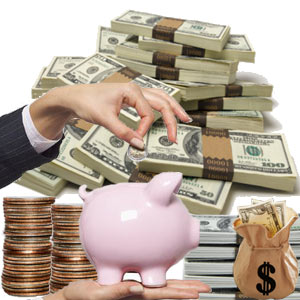
1) Compare the bottom line
Before you go asking for a raise, you have to know where you stand on the playing field. Research the going rate.
Check out online services like Salary.com. On this site you can also get more in-depth personal salary reports from $30-$80 that include bonus information and salary tips.
Before you go asking for a raise, you have to know where you stand on the playing field. Research the going rate.
Check out online services like Salary.com. On this site you can also get more in-depth personal salary reports from $30-$80 that include bonus information and salary tips.
The Bureau of Labor Statistics is also a good way to get an idea of those in your field and geographic region. Look at http://money.cnn.com/2006/01/06/pf/saving/willis_tips/www.bls.gov and search by area and occupation and you'll be able to see the average hourly and annual salary of specific jobs.
2) Toot your own horn
We've all been taught the virtues of modesty. But if you're looking to make a case for more money, you have to show off a little.
Create a portfolio of your achievements. Try to use number and exact figures when possible, like you managed a staff of twelve or you increased sales by 25%. Use words like "First" and "highest" and "best."
After each accomplishment ask yourself how this helped the company. After all, that's what your supervisor is interested in.
If a raise seems out of the question, ask about a bonus instead. According to a recent study by Hewitt Associates, a majority of companies are going to be cutting back on annual raises and relying more on bonuses.
We've all been taught the virtues of modesty. But if you're looking to make a case for more money, you have to show off a little.
Create a portfolio of your achievements. Try to use number and exact figures when possible, like you managed a staff of twelve or you increased sales by 25%. Use words like "First" and "highest" and "best."
After each accomplishment ask yourself how this helped the company. After all, that's what your supervisor is interested in.
If a raise seems out of the question, ask about a bonus instead. According to a recent study by Hewitt Associates, a majority of companies are going to be cutting back on annual raises and relying more on bonuses.
3) Be more likeable
Remember when we told you that you should go to all those holiday parties? We hope you listened.
Being like-able around colleagues goes a long way in career advancement, according to a recent study.
In fact, being well-liked is more important than being competent. In the Harvard Business Review study people didn't want to work with someone who is disliked, no matter how skilled they are.
So how can you boost your like-ability factor at work? According to Tim Sanders, the author of "The Likeability Factor" there are a few practical things you can work on to boost your emotional intelligence.
To begin with, stop criticizing people, instead criticize outcomes. You should also be smarter with e-mail recommends Sanders. Don't hit reply all, he says and never send an e-mail when you're mad. Keep it in your draft folder until the next day and chances are you won't send it.
And finally, don't forget your smile. Over half of your personality is visually determined.
Being like-able around colleagues goes a long way in career advancement, according to a recent study.
In fact, being well-liked is more important than being competent. In the Harvard Business Review study people didn't want to work with someone who is disliked, no matter how skilled they are.
So how can you boost your like-ability factor at work? According to Tim Sanders, the author of "The Likeability Factor" there are a few practical things you can work on to boost your emotional intelligence.
To begin with, stop criticizing people, instead criticize outcomes. You should also be smarter with e-mail recommends Sanders. Don't hit reply all, he says and never send an e-mail when you're mad. Keep it in your draft folder until the next day and chances are you won't send it.
And finally, don't forget your smile. Over half of your personality is visually determined.
4) Find the hot jobs
The beginning of the year is a good time to look for jobs says John Challenger of career outsourcing company Challenger, Gray and Christmas.
Just as people may be looking to improve themselves, companies are also looking to expand their business and take risks.
If you think it's time for a new job, think health care. "This is the strongest, most consistent area for job growth," says Challenger.
Other good areas to look for jobs include technology and international fields. "With increasing globalization, knowing another language is very valuable," he said.
Just as people may be looking to improve themselves, companies are also looking to expand their business and take risks.
If you think it's time for a new job, think health care. "This is the strongest, most consistent area for job growth," says Challenger.
Other good areas to look for jobs include technology and international fields. "With increasing globalization, knowing another language is very valuable," he said.
5) Test Drive a Dream Job
If you have the luxury of pursuing your dream job, think about test-driving a career...for a price.
You can be trained as a pastry chef and work as a chocolatier in Portland Oregon for two days.
For $349 you can be an innkeeper at a Bed and Breakfast for a day.
If you fancy vintage cars, you can be a car restorer in Detroit for a grand.
You can be trained as a pastry chef and work as a chocolatier in Portland Oregon for two days.
For $349 you can be an innkeeper at a Bed and Breakfast for a day.
If you fancy vintage cars, you can be a car restorer in Detroit for a grand.






